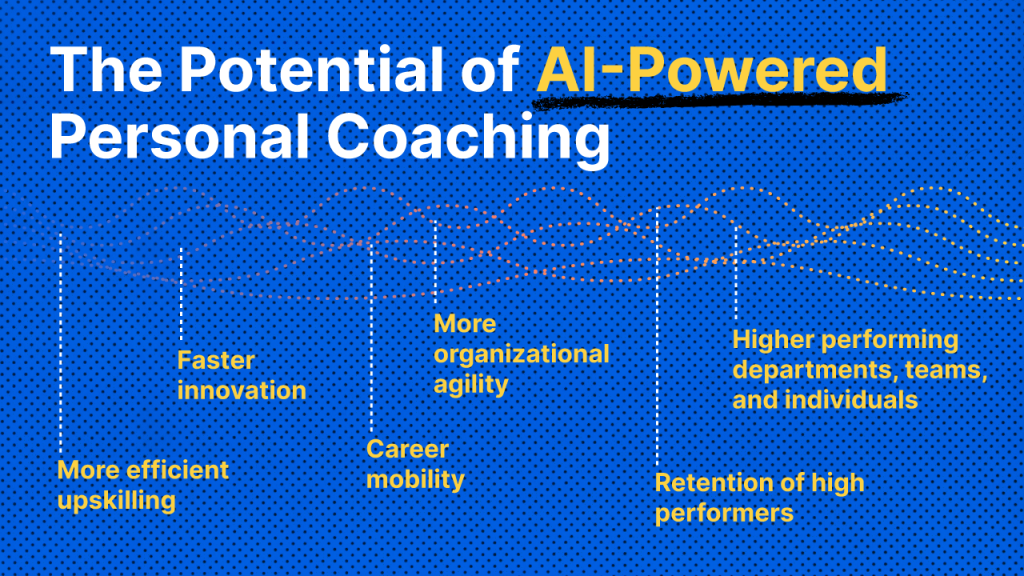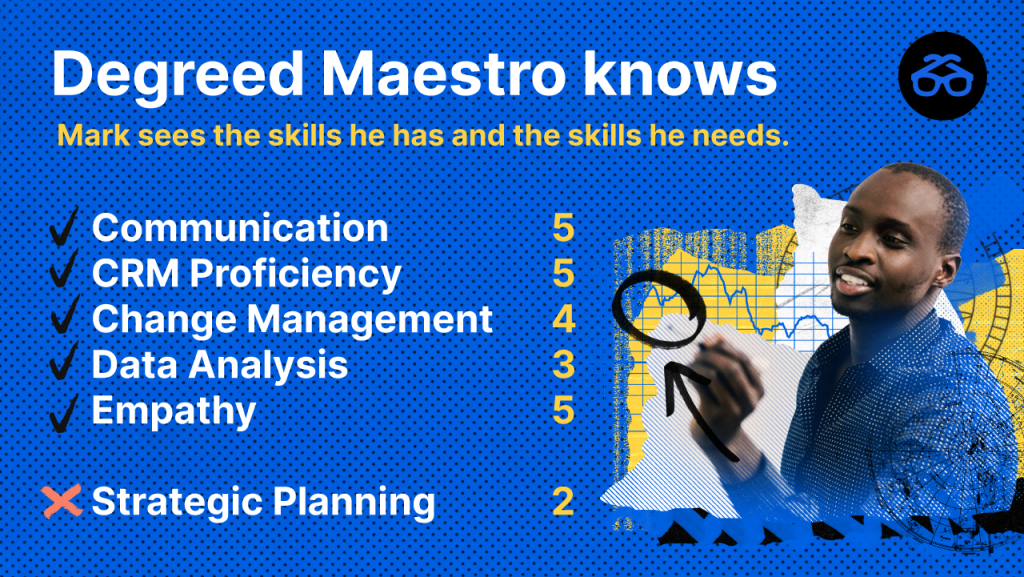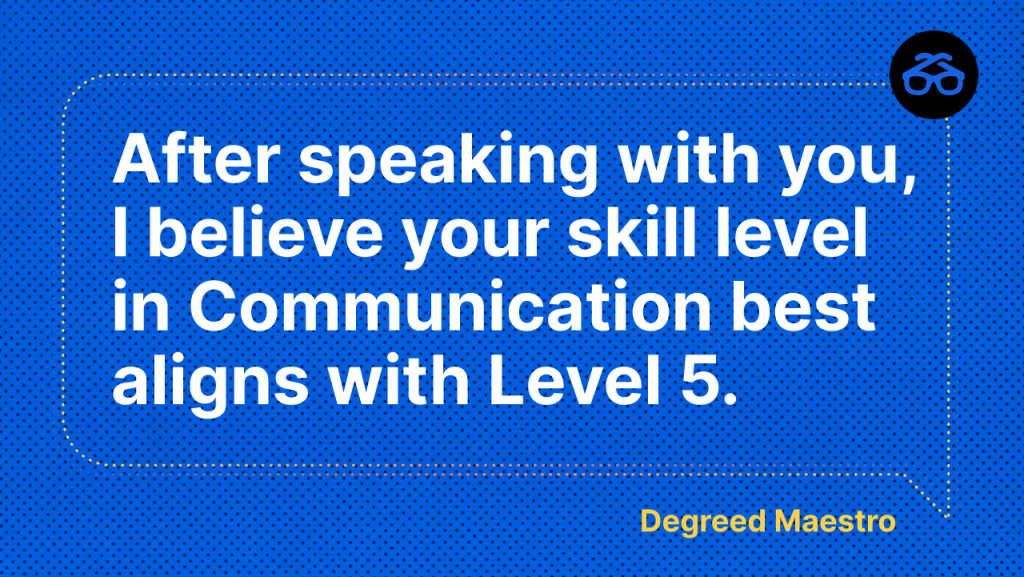This is the first post in a series on personalized, AI-powered coaching with Degreed Maestro. See the second and third.
Picture this: A personal coach that helps each employee pinpoint skills to develop, provides personalized development pathways focused on those skills, then tracks and measures growth.
What would that unlock for your business? If yours is like most organizations, it would speed up innovation, increase organizational agility, and equip your workforce to excel across every department, team, and role. You could provide more efficient upskilling—for the skills that matter most to your company—and create career mobility that retains high performers.
Coaching like this is highly impactful. It’s also highly personalized and time-consuming, which means it’s expensive and difficult to scale. And that’s where embedded AI comes in.
AI-Powered Virtual Coaching in Degreed
If you’re an employer, you’ve probably dreamed of hiring someone with a wide range of skills, someone who not only discovers and surfaces key insights, but puts those insights to action for meaningful outcomes. In learning and development functions, this means someone who understands your business needs and the needs of each learner and puts that knowledge to work to build learning programs that efficiently transform the workforce you have into the workforce you need.
Degreed Maestro, our AI purpose-built for learning, is like that person.

The impact of Maestro, and its potential for your organization, is vast.
With its executive coaching, career coaching and targeted employee skill reviews, Maestro assesses the skills your people have today and helps them grow those they’ll need for tomorrow. With both voice and text-based options, users have flexibility to converse with Maestro in the way that best suits their needs at a given moment. Its content audit capabilities ensure employees quickly find high quality, up-to-date material, so they can put learning and skills to action and drive change for your business.*
Maestro retains past conversations and applies that personalized content each time a user engages with it. Available 24/7, Maestro also provides relevant learning recommendations attuned to each individual employee’s skills, preferences, and goals. This means that personalized Pathways guide each learner with highly relevant content tailored to their goals and preferences, so they can grow skills faster, making your business more adaptable to change. In addition, this reduces the time L&D spends on curation, freeing your people to focus on high-impact work such as cross-functional collaboration and demonstrating the value of learning on the business.

It all adds up to big benefits. You can give your employees easy access to critical feedback, actionable guidance, and impactful learning.
But how does all of this actually help your business, L&D, and employees? To answer that, let’s take a look at how one employee—we’ll call him Mark—engages with Maestro at different stages of his career to perform better on the job. In future blog posts, we’ll look at additional ways Mark improves his performance with the help of Maestro.
Maestro at Onboarding: ID’ing Skill Gaps & Recommending Learning
Mark has joined Acme Inc. as a Sales Director. As he onboards, his organization gives him access to the Maestro Skill Review Coach to baseline assess the skills required for his new role.
To start, Mark’s skills from previous roles are inferred and suggested to populate his Degreed profile. Next, he wants to clarify his skill levels so Degreed can personalize learning recommendations according to his level of expertise. To do this, he turns to Degreed Maestro.
Mark focuses on the skills necessary to succeed as a Sales Director. He asks Maestro what five skills are most important for his role, and Maestro quickly responds with a list of critical skills. Maestro acknowledges that Mark is already proficient in most of the skills as noted in his profile, but there is one that he’s not very confident about: strategic planning.

Based on his interviews before joining the company, Mark understands that strategic planning will be important to the role. But he isn’t sure how Acme. defines strategic planning or how to rank his own proficiency against this need, so he asks Maestro to evaluate his capabilities in strategic planning first.
Maestro asks a series of questions that uncover Mark’s experiences with this skill. Mark realizes he often exercised this skill in a previous role as a Client Success Manager by setting clear objectives for each client, creating action plans, and working cross-functionally to make sure his clients had all the information and resources they needed.
Based on Mark’s answers, Maestro concludes Mark’s skill level in strategic planning is a 2 out of 5 on the Acme scale, whereas Mark in his new role should be at a 3. To become more proficient, Maestro recommends specific articles, podcasts, and courses as well as mentors within the organization who can help Mark apply this skill on the job.
Mark appreciates the content recommendations, but he’s time-poor as he onboards in the new organization and therefore eager to uplevel as efficiently as possible. He asks Maestro to create a customized learning Pathway in Degreed to guide him along his learning journey.
Maestro quickly produces a personalized Pathway, and Mark immediately takes action on Maestro recommendations. He even sends his manager a summary of his assessment to confirm these are the right areas to develop—and to demonstrate his determination to grow in areas where he has a skill gap.
With the help of Maestro, Mark focuses his development on the areas that matter, and he successfully transitions into his new role. When Mark has his first performance review, he’s able to show the progress he’s made in skill development by referencing his learning history with Maestro and the resulting skill growth.
Personalization Powered by L&D
Maestro provided Mark with important assessments to pinpoint his skill gaps according to the Acme definitions, scale and expectations. Then, Maestro created personalized development recommendations for a smooth, efficient onboarding experience.
Behind the scenes, the Acme Talent and L&D team already completed important work that influenced the Maestro recommendations. For example, Maestro knew what skills were needed as a Sales Director because the team had used AI-powered skill-to-role mapping in Degreed to receive recommendations. From there, the team worked with Sales to confirm which skills were most important for the Sales Director role.
When Mark asked what skills he needed, Maestro highlighted the right skills because Mark’s company already defined them in Degreed.*
In addition, the team used Degreed Skills+ to customize the company’s skill taxonomy and skill scale, choosing the exact skill labels to appear in the LXP and opting for a five-point scale to measure skills. The team also harnessed AI to create unique descriptions for each skill level for each skill.
A Skill Level 1 in AI Augmented Innovation, for example, has a different description than a Skill Level 1 in Strategic Planning.
AI helped Talent and L&D get started with these descriptions, but ultimately L&D was able to customize the descriptions in ways that worked best for the organization.
When Maestro evaluated Mark’s skills, it was able to do so in the context of how the organization defines a Skill Level 1 vs. a Skill Level 2 in a specific skill. This information was used to give an accurate skill rating according to the organization’s definitions for skill levels.*

Why This All Matters
Starting a new role can be stressful for an employee. Ineffective onboarding not only makes a bad impression on the new employee, but it also impacts time to productivity. Strong, personalized onboarding helps employees perform better, and faster. For example, TEKsystems saw a four-week reduction in time-to-revenue-generation among employees who onboarded with Degreed.
Maestro played a key role in supporting Mark during this transition. The resources Maestro shared helped accelerate Mark’s time to productivity, delivering value to the business—enabling skills-based, personalized learning.
With the power of AI, Mark quickly identified skill gaps and accessed exactly what he needed in the format he needed it. Mark got the support he required to succeed, and the business benefited from his quick, effective transition.
In a future blog post, we’ll look at how Mark creates a custom coach as an enablement tool to support sales when the company launches a new product.
Find out more.
Keep reading. Check out Degreed Experiments to stay up to date on our latest AI explorations.
Schedule a personalized one-on-one call with us today.

* This functionality is on the Degreed product roadmap.
